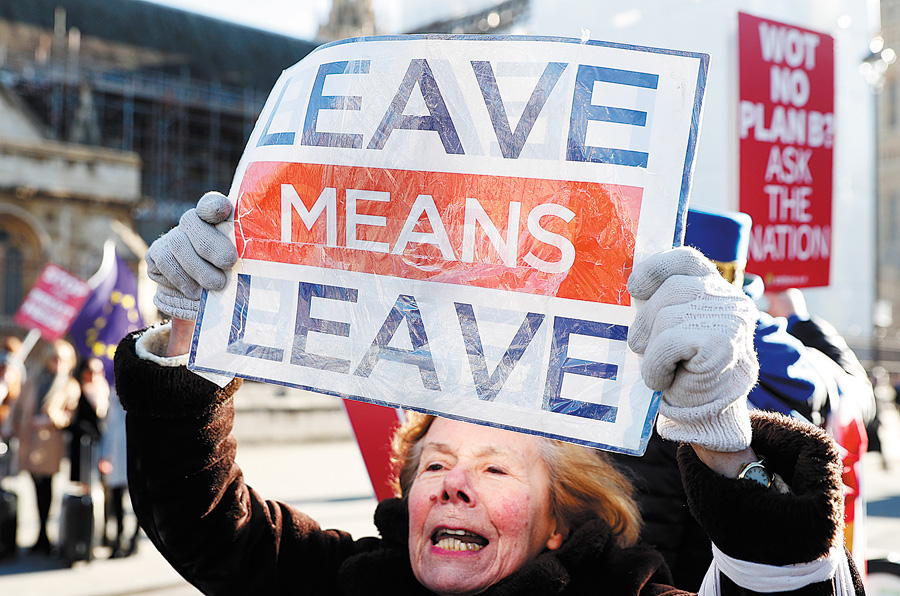May seeks more negotiations with Brussels
By Julian Shea in London | China Daily Global | Updated: 2019-01-29 21:09

British Prime Minister Theresa May has announced she will re-open talks with the European Union as she attempts to make headway in her bid to sort out the terms for the United Kingdom's exit from the EU, currently scheduled to take place at the end of March.
At the beginning of a Parliamentary debate on amendments to her Brexit proposals, which have already been endorsed by the leaders of the other 27 EU member states but which were emphatically rejected by MPs earlier this month, May said she would be seeking "significant and legally binding change" to the contentious issue of the Northern Ireland backstop.
The backstop is the insurance plan that prevents checks on goods and people crossing the border between Northern Ireland and the Republic, but some MPs fear its lack of clarity could see the UK having to observe EU rules indefinitely, despite having supposedly left the bloc.
Acknowledging a very obvious lack of enthusiasm from the EU for any further negotiations over what European commission president Jean Claude Juncker has already called "the best deal possible for Britain", May said there was a "limited appetite" in the EU, but she believed she could "secure" concessions.
MPs voted down May's proposals in spectacular fashion earlier this month but some of the most vehement Brexit supporters who voted against her last time have suggested they may back her in the future if she can get the backstop agreement changed.
Seven amendments were put forward for debate on Tuesday. One that May has encouraged MPs to support was put forward by Conservative backbencher Graham Brady and calls for the Northern Ireland backstop to be replaced with unspecified "alternative arrangements" to prevent a hard border, in order to get May's previously rejected terms approved at the second time of asking.
May initially rejected the proposal before a last-minute change of heart and has urged her MPs to support it. Regardless of how it goes down in Europe, on the home front at least, it looks to have been a tactical move

Northern Ireland's Democratic Unionist Party, upon whose votes May's government relies for survival, has supported it, and even former foreign secretary and keen Brexit supporter Boris Johnson said he would "gladly" vote for the amendment if May confirmed she would re-open dialogue with Brussels.
Another idea that will be debated is one that has formed an unlikely alliance of convenience between hard-core Brexit supporters such as Jacob Rees-Mogg and former Remain backers such as Nicky Morgan.
It proposes changing May's divorce terms by coming up with a new proposal for the Northern Ireland backstop and would also extend the UK's proposed post-Brexit transition period by one year, until the end of 2021.
In the interim, the country would continue to follow EU rules, contribute to its budget, and ensure the rights of EU citizens, while buying time to reach a free-trade deal.
The opposition Labour Party says it will back an amendment by Yvette Cooper delaying Brexit for nine months, if Parliament has not managed to ratify terms by the end of February, and there are other amendments aimed at ruling out altogether the prospect of a no-deal Brexit, which is what would happen if the UK left the EU with no divorce terms.
A no-deal Brexit would have huge consequences in terms of disruption to things such as food imports, with many of the country's leading retailers having already stated their fears over such an outcome because of the huge problems it would likely cause, and potential subsequent social impacts.
The National Health Service is stockpiling medicines in anticipation of such a situation, and there are even plans to deploy troops on the streets in the event of related public order issues.
























